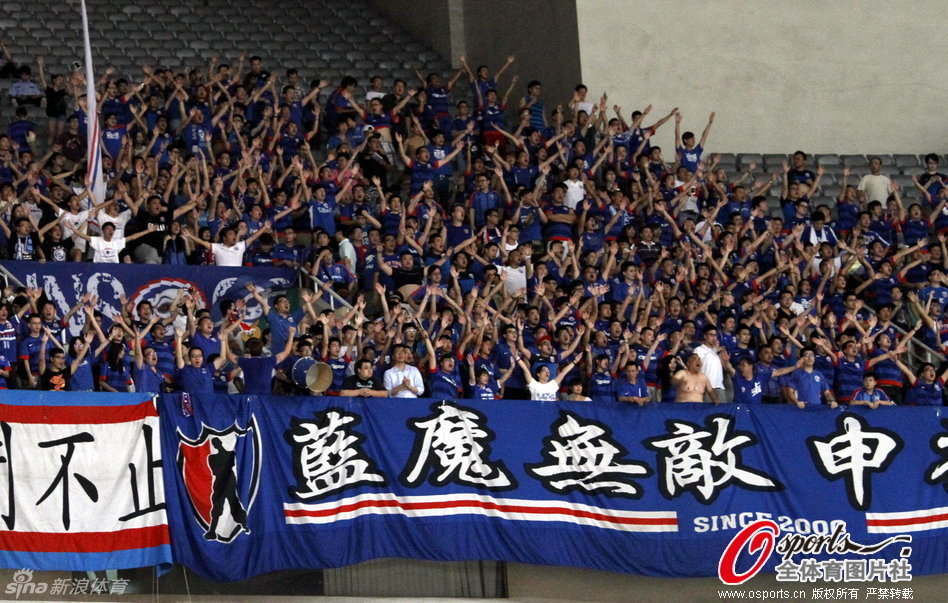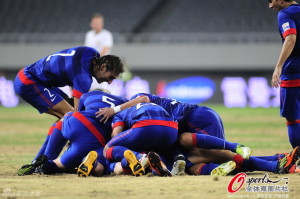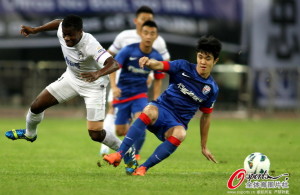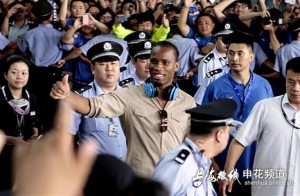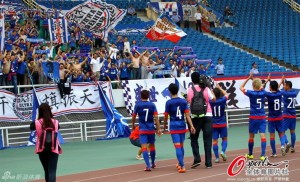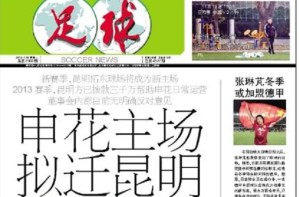With 2013 coming to a close, its time for the annual round-up of how Shanghai Shenhua performed. Correspondent Cameron Wilson gets out the enigma machine to try to make sense of the CSL’s soap opera club and comes to a rather disturbing conclusion…
After a traumatic and truly bizarre 2012, Shanghai Shenhua started this season in the worst shape of their history. Out went Drogba and Anlkea, in their place came not only international, but mediocre domestic journeymen too. The sudden departure of club legend Yu Tao to Shanghai Shenxin was a further blow, and throw in a minus-six points deduction, and for most observers, your correspondent included, Shenhua were staring at a long hard season which would end in relegation if they did not improve upon last season’s disjointed shows – or so if our Shenhua preview for the season was to be believed.
Start as you mean to continue…
At the start of the year, there was further discord at Hongkou as club owner Zhu Jun indulged in distasteful theatrics regarding Drogba’s unilateral departure due to unpaid wages. In an utterly cringeworthy and embarrassing protest, Zhu filed a petition with FIFA to say Drogba’s transfer to Galatasaray was illegal and vowed to block it. But nearly a year on, nothing has come of this other than FIFA ruling that Shenhua owe Drogba wages and must pay them. This proves that, instead of admitting what was plain for all to see, namely that the club was unable to continue paying Drogba’s astronomical salary, Zhu Jun instead chose to indulge in a pathetic face-saving exercise. It was on this sour note that Shenhua began their toughest season in their two-decade history.
In the kind of twist that seems common in China, Shenhua began their season against the other team punished for misdemeanours in the distant past, Tianjin, in what was dubbed a “minus six-pointer.” It was a match most notable for the impressive performance of new centre-back Rolando Schiavi who came from Boca Juniors – the Argentinian stopper being 40 years old was an understandable concern for fans but he acquitted himself well and would go on to be a stabilizing influence in Shenhua’s shaky defence.
The opening month of the season saw Shenhua take first blood in the Shanghai derby series with a win over Shenxin, and take their first step towards being crowned “comeback kings” by reversing a two goal deficit to draw 2-2 against Liaoning. However, despite the positive start to the season, drama was never far away and the result against Liaoning came despite all of Shenhua’s three South American stars refusing to play due to unpaid wages. These financial problems, rumbling on from the previous season’s shareholder dispute, would continue to dog the club for the remainder of the season, and ultimately lead to the resignation of head coach Sergio Batista.
Construction of the comeback kings
By April, Shenhua were already out of minus points with some good results, including another comeback smash and grab victory over second-placed Shandong. The comeback kings would remain unbeaten for their first eight games, even coming back from three goals down away to Wuhan in a remarkable and truly memorable game for Shenhua fans. Powered by a siege mentality, astute coaching from Sergio Batista, a heroic Wang Dalei in goals, and an unearthed foreign gem in Syrian striker Firas al-khatib, it took the mighty Guangzhou Evergrande to deliver Shenhua’s first defeat, in a pulsating game which made the Cantonese side look ordinary.
Late May saw without doubt a huge blot on an otherwise very respectable season when, in a monumental calamity, a second-string Shenhua were dumped out of the cup at home by amateur China League 2 (third division) side Dali Ruilong. It was a truly shocking performance best forgotten. Shenhua soon got over the setback however with a win over old rivals Guoan at home, but things went flat for the rest of the first half of the season as the boys in blue failed to win again before the mid-summer break and succumbed to their second defeat away to Changchun.
Summer syndrome & mid-season upheaval
The start of the summer saw Shenhua’s annual Xiaji Zhonghezhong (summer syndrome) slump start to take root, going five games without victory. It also brought the half way point of the season, another noteworthy seasonal milestone and one known for being when the Hongkou revolving door starts to spin again as staff leave and newcomers arrive. This season was no exception as Sergio Batista abruptly left the club, on the eve of a vital relegation match against Tianjin, complaining of unpaid salary. Fans looked on in disbelief – how could a team facing relegation, yet significantly over-performing, allow such a central figure depart for such an avoidable reason, at a critical moment in the season? It was one of the many boardroom decisions which bordered on footballing suicide this year.
Shen Xiangfu had been appointed “Chinese Player”coach at the start of the season. It was a very odd appointment, considering all but 5 players at the club were Chinese. Did this mean Batista was there to manage only those five? Most viewed Shen as a stop-gap appointment so there could be someone in charge immediately after Batista left. This is exactly what happened although club insiders say Batista would have been relieved of his duties much earlier were it not for Shenhua exceeding expectations.
The former Henan and Beijing Guoan boss brought a defensive and dull tactical outlook compared with Batista, but in all honesty it was hard to criticize given the lack of resources at his disposal. He managed to scrape a draw away to Tianjin in his first match – a relegation six-pointer this time rather than minus six-pointer of the start of the season. Then, a third Shanghai derby win, this time at home to Shenxin, meant a good start for Shen Xiangfu. He was helped by the return of Gio Moreno, who, in a peculiar turn of events, announced he was joining a club in the Middle East, and sat out several games, only for the move to fall through and for him to return to Shanghai in time to score against Shenxin in the derby.
That victory brought only short-lived respite in an otherwise dodgy summer. Having gained so many early season points with late goals and comeback victories, karma came home to roost as the conceding of last minute goals against Liaoning and Shandong turned a victory into a draw and a draw into defeat, respectively. A very poor defeat saw Shenhua fall to a 1-0 defeat at home in the derby against Hangzhou, and for a while it looked as if the Hongkou side were in serious trouble.
But three Giovanni Moreno-inspired wins on the trot at the end of August, against Qingdao, Shanghai East Asia and hapless Wuhan effectively guaranteed mission success for Shenhua in 2013 by avoiding relegation. In fact, Shenhua won every single one of their last remaining five home games to finish a very respectable 8th, which would of course have been joint 4th were it not for the silly -6 points deduction.
2013 – Better without Drogba
The crucial question in understanding how Shenhua did in 2013, is of course to compare it to last year with the big bucks spending on Drogba and Anelka et al. Taking a look Shenhua’s final CSL placing from these two seasons side-by-side (this seasons points deduction removed for fair comparison) reveals a very telling picture:
2013 9th W11 – D11 – L8 – F36 – A36 – Pts 44
2012 9th W8 – D14 – L8 – F39 – A34 – Pts 38
Yes, that’s right, despite not having former premiership stars on stupid money, and a vastly inferior squad on paper, Shenhua did better this year than last. The reasons why Drogba and Anelka didn’t stay and or fit in have been done to death, so let’s keep our conclusion simple. We can sum up the difference between this season and last in one word: teamwork. Last year Shenhua was disjointed and disunited on and off the field. It’s simply naive to expect anything different when putting two premiership stars into a team of mainly limited Chinese players. This year however Shenhua had a much clearer vision and a more realistic approach – avoid relegation, and use foreign players who are better than the domestic ones but not overwhelmingly so to the point of destroying any kind of balance in the team.
This year probably felt like a relief to staff who were still around, there were no huge premiership stars breathing down their neck reminding them of their own limitations, and the large influx of new players probably helped for once by bringing in some fresh blood not traumatized by the debacle which was 2012. There was clearly was a siege mentality to some extent, Shenhua’s finances and sale of many key players meant no-one was under any illusions that this was going to be a tough year and the club and fans had to either stick together or face relegation this year.
Team spirit and individual inspiration
On the field, there were many more plus points than expected, there was a lack of ego and a togetherness about the squad not seen at Hongkou for quite some time. The signing of Firas Al-khatib was a masterstroke, albeit probably an unintended one. The charismatic Syrian striker selfless attitude was exemplary, he either made or scored almost all Shenhua’s goals in the opening few games of the season and remained a hugely positive and professional influence throughout. Rolando Schiavi’s immense experience at the back was invaluable and his calm play rubbed off on Li Jianbin and the mercurial Dai Lin. Wang Changqing and Wang Shouting were both journeymen players, but their work ethic was just what Shenhua needed. The same could be said of Dady – not the most talented player but maximum effort was made and he integrated into the squad seamlessly. The capture of Xu Liang from Guoan turned out to be equally significant, despite being one of the most talented players in the squad he knew what he was getting himself into at Shenhua at buckled down and fitted right in despite coming from a much better-run and staffed club, Guoan.
In goals, Wang Dalei was absolutely massive and without him it’s more than likely Shenhua would have been relegated. The contribution of goalkeeping coach, former England Ian Walker can’t be ignored. Before his arrival Wang was a keeper with potential but one who was prone to error. Walker has taken Wang’s game to the next level and then some – the relationship between these two contributed at least as much as any other factor to keeping Shenhua in the CSL. Another example of continuity here, both were with the club last year and the benefit of their continued co-operation plain for all to see.
Even the more showy and individualistic (or some might say selfish) members of the team were dragged back down to earth by the gravity of the rest of the squad’s togetherness. Gio Moreno’s contribution was also crucial, despite his wastefulness his obvious raw talent eventually shone through, his goal in the final match of the season against Changchun will long be remembered as one of the best scored at Hongkou. Song Boxuan, another flair player sometimes lacking teamwork credentials, finally stepped out of the shadow of Feng Renliang and for at least some of the season was on fire.
Accidentally avoiding relegation?
For the fans, 2013 was a memorable and satisfying year, particularly after the massive anti-climax of the previous season. Memorable because of all manner of excitement was had both at home on the road – the comeback games, the moments of great skill from certain players, the Shanghai Derby whitewash, the now customary narrow victory over Guoan at home against the odds, and just general against the odds everywhere. And the season was satisfying because Shenhua defied the predictions of many to seemingly avoid relegation comfortably.
What is alarming however is how all of the successes this season seemed to be a result of luck more than anything else. On the pitch, Shenhua were a little fortunate in some games, taking 3 points when the result could have gone either way. There did not seem to be any cohesive or strong tactical approach, key games were won because of moments of individual excellence, particularly from Moreno, Firas and Wang in goals, and to a lesser extent, Song Boxuan and Xu Liang. In short, Shenhua’s 2013, was a good case study for scholars of the game to understand the importance of motivation and team spirit in the absence of strong tactical management and outstanding talent.
Off the field, the management’s behaviour seemed reckless, especially considering the perilous situation the club was in this season. Allowing Sergio Batista to leave over unpaid wages beggars belief. Surely, with the club with its back against the wall, fighting relegation, the boardroom could have found the money from somewhere to pay him? In hindsight, Shen Xiangfu was an adequate replacement and fit for purpose. But it looked like the boardroom wanted to force him to resign rather than sack him and pay compensation. In the circumstances, replacing your manager in such a manner just doesn’t look like the actions of a club serious about staying in the CSL. Especially when your manager is performing minor miracles and talking about ACL qualification.
Likewise, selling Wu Xi, the club’s top right back, in the close season and then not even signing a replacement just looks incompetent. This is basic football ABC. You sell your best player in a position, then you use the money, or at least bring in another player from somewhere to replace him. Understandable if the replacement might not be quite as good as his predecessor. But unforgivable to not at least sign someone. Instead, Shenhua played a centre-half and a midfielder in this position.
The signing of Rolando Schiavi, at 40 years old, was also a gamble. Again, hindsight shows he was a good signing who steadied the back four. But he could have easily been the type who came over to Shanghai for what was obviously one last payday and played accordingly. Your correspondent would love to believe that Shenhua had done their homework and knew he would be solid. But Shenhua have so clearly neglected to do any such research in the past. At any rate, was there not a better option of signing someone who was so obviously only ever going to be here for one season? Despite his success, the decision itself to bring Schiavi can be legitimately questioned.
Firas was a solid signing, but again he could have turned out to be a total flop. He had a reasonably impressive CV as one of Syria’s best ever strikers. But we are talking about a country which has never gotten anywhere near qualifying for a World Cup and is not even a regular at the Asian Cup. Plus, Firas was languishing in the Iraqi league before coming to Shanghai. It may seem harsh to criticize the signing of such a successful player, but the point remains, was the homework done? Was it really an inspired signing or did Shenhua just get lucky? The same could be said of Dady, he had an extremely mediocre record and could have been another Mattieu Mansett – something Shenhua definitely could not afford this year.
Another personnel decision which is much less debatable was the frequent appearances of Jiang Kun in midfield. It’s utterly baffling to this correspondent how a player, who is so blatantly unfit and unable to make any real useful contribution to a game, can even get in the team ahead of a youth player, never mind Cao Yunding. Cao may have had a poor season for whatever reason, but its just so completely ridiculous that he was kept out of the team by a 35-year-old aging smoker. Did Jiang Kun’s appearances highlight the utterly shocking lack of strength and depth in the squad, or his status as Zhu Jun’s old favourite? Most likely both.
Speaking of which, the threadbare squad was another own goal. First team players were constantly played out of position rather than calling up a reserve to play in a specified role. And in another hard-to-fathom move, several of the club’s more promising youth players were loaned out to clubs in China’s lower divisions. This left the squad critically vulnerable to injuries. This was a factor completely under the club’s control yet they didn’t ensure adequate backup, and instead seemed to simply hope for good fortune. Similarly the timely payment of salaries was lacking and clearly impacted performance. It’s difficult to believe a better solution could not have been found considering the club’s dangerous position.
CSL or CL1 – win-win for Zhu Jun
Simply put, all of the above factors in combination suggests the management, or at least, Zhu Jun, would have let relegation happen on purpose. When looked at the perspective of starting the season with a -6 point deduction and a vastly decreased player budget, too many things under the club’s complete control were left to chance. Some may say the signings may be the best Shenhua could get their hands on. But your correspondent believes more money could have been found to bolster the squad. In the end Shenhua were seven points off relegation, not such a huge margin. Victories over Shandong and Wuhan at home were just two examples of results heavily reliant on good fortune. Things could have easily turned out very different, a couple of results going the other way would have left Shenhua right in the thick of it on the final day of the season and who knows what would have happened then.
Zhu Zhun’s approach in 2013 was clever and the modus operandi of a seasoned opportunist. All-in-all it was a win-win situation for him. Shenhua stay up, he can claim expert management on a shoestring budget and up against a -six point deduction. If Shenhua were relegated, it would still benefit him personally. Sources say he has more money to invest but refuses to do so until he has full control of the club, and that Drogba and Anelka would still be at Shenhua had he not been given the controlling share he said he was promised. The Drogba and Anelka coup, the threatening to move the club to Anhui, then Kunming, the non-payment of salaries…this shows how determined he is to get full control. Shenhua’s relegation would have suited his agenda very well – it would have put more pressure on the state-owned enterprise shareholders to transfer their remaining share to him. They may have decided the team going down was a good time to end their ties and also distance themselves from the indignity of the club’s fall and put the blame on Zhu Jun. At the same time, Zhu Jun could plead not guilty to masterminding the relegation of a once-great club by pointing to the fallout from the protracted power-struggle as having made the cuts and other odd decisions unavoidable. In the fog of war, which is thicker and more impenetrable in Chinese football than in any other theater, his cover would have been difficult to disprove. But just remember what happened the last time a club from a top-tier Chinese city went down to the China League One – Guangzhou Phrama were bought out by Evergrande… Relegation was a catalyst for the Guangzhou club’s renewal and Zhu Jun may have seen the merits of following the same path, perhaps with a much smaller investment.
Of course, for this argument its impossible to find the smoking gun and Zhu Jun knows it. Because there are a lot of guns and a lot of smoke in China. That’s the real truth.
